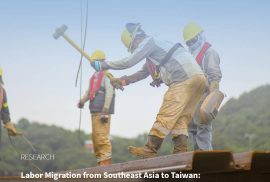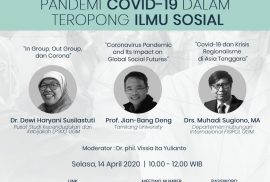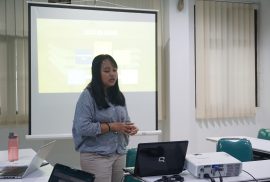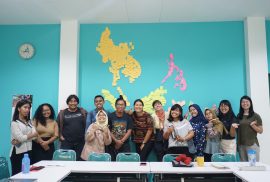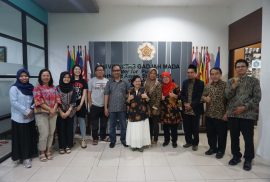As a part of the working collaboration between the Center for Southeast Asian Social Studies, Universitas Gadjah Mada and the Graduate Institute of Futures Studies, Tamkang University, Taiwan, A joint paper by Prof. Jian Bang Deng, Prof. Hermin Indah Wahyuni and Dr. phil. Vissia Ita Yulianto is just published. This paper calls attention to the close linkage between transnational mobility and social inequality. It showed how the transnationalization of social inequality could get new faces through the new waves of labor migration. The issue of social inequality not only reflects the policy levels of receiving and sending countries, but it also is shown in experiences of the individual labor migrants in their transnational careers.
—-
Sebagai bagian dari kolaborasi antara PSSAT UGM dan Universitas Tamkang Taiwan, telah dipublikasikan joint paper oleh Prof. Jian Bang Deng, Prof. Hermin Indah Wahyuni dan Dr. phil. Vissia Ita Yulianto. Paper ini memberikan gambaran mengenai hubungan mobilitas transnasional dan ketimpangan sosial. Dalam penelitian ini, dijabarkan bahwa transnasionalisasi dari ketimpangan sosial dapat memberikan gelombang baru isi buruh migrant. Isu ketimpangan sosial bukan hanya direfleksikan oleh kebijakan pengirim dan penerima tenaga kerja namun juga terlihat dari pengalaman yang dialami para migran saat bekerja diluar negeri.
Seri kelima dalam Webinar SEATALK Pusat Studi Asia Tenggara Universitas Gadjah Mada yang dilaksanakan pada Kamis, 12 Mei 2020. Webinar ini mengundang Dr. Siddharta Chandra dari Michigan State University, USA dan Sumadi Lukman Anwar, MD., Ph.D, FKKMK UGM
Lessons from the 1918 influenza pandemic for the COVID-19 pandemic and Experience from Cancer Navigation in Indonesia
“1918 inlfluenza pandemic is the mother virus which gave birth to major global pandhemic which had taken the lives of millions of people worldwide”, said Prof. Siddarth Candra, an epidimiolgist in the WEBINAR series of South East Asia Talk, organized by the Centre of Southeast Asian Social Studies (CESASS), Universitas Gadjah Mada, a center of excellence in social science under the Indonesian Ministry of Research, Technology and Higher Education since 2016. This Webinar 36# was a cooperation between CESASS and the American Institute of Indonesian Studies (AIFIS), State University of Michigan, USA.
Seri keempat dalam Webinar SEATALK Pusat Studi Asia Tenggara Universitas Gadjah Mada yang dilaksanakan pada Selasa, 28 April 2020. Webinar ini mengundang Prof. Bambang Hari Wibisono, Kepala Pusat Studi Perencanaan Pembangunan UGM dan Prof. Sigit Riyanto, Dekan Fakultas Hukum UGM.
[embedyt] https://www.youtube.com/watch?v=V2By-Xkd9RM[/embedyt]
Seri ketiga dalam Webinar SEATALK Pusat Studi Asia Tenggara Universitas Gadjah Mada yang dilaksanakan pada Selasa, 21 April 2020. Webinar ini mengundang I Gusti Agung Made Wardana Ph.D dari Departemen Hukum Lingkungan, Fakultas Hukum UGM dan Dr. Aprinus Salam M.Hum, Kepala Pusat Studi Kebudayaan UGM.
RELASI SOSIAL – EKOLOGIS DAN KENORMALAN BARU
“Setelah berakhirnya pandemi Covid-19, kemungkinan akan kembali ke skenario business as usual atau munculnya kenormalan-kenormalan baru karena belum ada bahasan mengenai bagaimana seharusnya membangun relasi sosial dan ekologis,” tutur I Gusti Agung Made Wardana, Ph.D. dalam webinar SEATALK #34 yang diselenggarakan oleh Pusat Studi Sosial Asia Tenggara (PSSAT) UGM pada hari Selasa (11/04/2020).
Seri kedua dalam Webinar SEATALK Pusat Studi Asia Tenggara Universitas Gadjah Mada yang dilaksanakan pada Selasa, 14 April 2020. Webinar ini mengundang Dr. Dewi Haryani dari PSKK UGM, Drs. Muhadi Sugiono dari Departemen Hubungan Internasional UGM, dan Prof. Jian-Bang Deng dari Tamkang University.
[embedyt] https://www.youtube.com/watch?v=8gMoWPGKOsg[/embedyt]
Seri pertama dalam Webinar SEATALK Pusat Studi Asia Tenggara Universitas Gadjah Mada yang dilaksanakan pada Kamis, 9 April 2020. Webinar ini mengundang Anis Fuad S.Ked, DEA. dari Departemen Epidemiologi Biostatik dari Kesehatan Populasi FKKMK UGM dan Drs. Kurniawan Kunto Yuliarso dari Departemen Komunikasi FISIPOL UGM.
[embedyt] https://www.youtube.com/watch?v=HRHyv-WGtng[/embedyt]
Meningkatnya pengguna internet berimplikasi pada peningkatan eksistensi portal berita online. Dilansir dari data Kominfo tahun 2018, sebanyak 43.000 portal berita online telah beredar dan hanya 200 diantaranya yang terverifikasi sehingga media online kini bias akan post-truth. Pusat Studi Sosial Asia Tenggara (PSSAT) menggelar SEA CHAT #23 oleh Lucia Yuriko dengan tajuk “Fenomena Post-Truth di Media Online” dengan fokus bahasan pada pemberitaan Livi Zheng dalam portal berita tirto.id.
“Post-truth adalah keadaan di mana fakta objektif kurang berpengaruh dibandingkan dengan opini atau emosional pribadi” tutur mahasiswi Ilmu Komunikasi, UPN Veteran Yogyakarta tersebut pada Rabu (11/03/2020) di Perpustakaan PSSAT UGM.
Since 1977, the United Nations (UN) has celebrated March 8th as International Women’s Day to fight for women’s rights and bring world peace. In commemoration of International Women’s Day, the Center for Southeast Asian Social Studies (CESASS) UGM held a discussion “Study of the Family Resilience Bill: The Setbacks of the Women’s Movement in Indonesia”. The discussion about women in the Family Resilience Bill was conducted by one of the PSSAT UGM researchers, Putu Yogi Paramitha, M.H. on Tuesday (10/03/2020) at the UGM PSSAT Library.
State Islamic University (UIN) of Sunan Ampel Surabaya (http://fdk.uinsby.ac.id/) visited Center for Southeast Asian Sosial Studies (CESASS), Universitas Gadjah Mada. This visit was a follow-up of cooperation between CESASS and PSSAT UGM. This cooperation included education and research, local multicultural socio-religious studies, academic publication, student exchange and lecturer exchange.
Welcomed by our CESASS Director, Prof. Dr. phil. Hermin Indah Wahyuni, this meeting attended by Dr. H. Abd. Halim. MAg (Dean of Da’wa and Communication Faculty UIN Sunan Ampel), Dr. Agus Santoso, S.Ag., M.Pd. (Vice Dean for Student Affairs and Cooperation, Da’wa and Communication Faculty UIN Sunan Ampel), Dr. Lukman Fahmi, A.Ah, M.Pd (Head of BKI Program, Da’wa and Communication Faculty UIN Sunan Ampel), Dr. Moch Anshori, S.Agm M.FiLL (Head Department of Da’wa, Da’wa and Communication Faculty UIN Sunan Ampel), Dr. Nikmah Hadiati Salisah, S.I.P., M.Si. (Lecturer, Da’wa and Communication Faculty UIN Sunan Ampel), and Dra. Mierrina, M.Si. (Lecturer, Da’wa and Communication Faculty UIN Sunan Ampel).
As a region that is growing rapidly from various fields, Southeast Asia has similarities with Latin America. These 2 regions share the same historical background as colonialism, cultural pluralism, and spiritualism. The Center for Southeast Asian Studies (CESASS) of Gadjah Mada University (UGM) held SEA CHAT #22 “Regional Literature Between SEA and Latin America, What Makes the Differences?” by Gladhys Elliona Syahutari, on Friday (02/28/2020) at the PSSAT Library. Attended by the public and intern students from Singapore, Belgium, and the Philippines.

